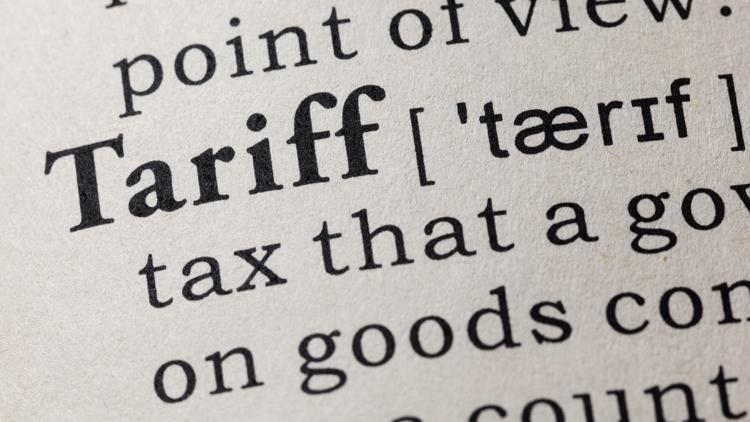WOODHULL, Ill. — In 2018, the Trump administration imposed 25-30% tariffs on a variety of Chinese goods. That was maintained by the Biden administration and even increased in sectors such as electric vehicles.
Now, Kamala Harris hasn't proposed specific tariff increases but has signaled she would follow the Biden administration's lead. Donald Trump on the other hand has proposed a 60% tariff on all Chinese goods if elected president.
Although tariffs are taxes on goods imported into the country, analysts have researched the impact future tariffs could have on American farmers and communities in the Midwest if countries with imposed tariffs chose to retaliate.
"The ag economy is a real big driver of the overall economy," Woodhull farmer and National Corn Growers Association Board Member Randy DeSutter said.
He said he's frustrated with the state of the farm economy.
"Right now, the price of grain is way down," DeSutter said. He shared low commodity prices put himself and other American farmers in a tough spot.
A study shared by the National Corn Growers Association and the American Soybean Association said new and current tariffs could have a lasting effect on United States farmers.
"The tariffs that were applied on corn and soybeans in the 2017, 2018 trade war situation are actually still on the books," National Corn Growers Association Lead Economist Krista Swanson said.
She said the tariffs are not being enforced at this time, but that could change if there are more penalties placed on imported goods. Swanson said agriculture is often a primary target when tariffs are imposed because of the industry's impact on the U.S. economy.
"If they put tariffs on China, for example, they are going to retaliate," DeSutter said.
The study predicts the 2018 tariffs and new proposed taxes could drop already low prices.
"What our study showed was that we could be looking at soybean prices declining anywhere from 60 cents to a dollar," Swanson said. The analysis predicted corn prices could drop by 13 cents per bushel if a 60% tax is imposed.
"To think about a situation that results in even lower prices, this is a really tough time for that to happen," Swanson said.
DeSutter shared higher priced American grains will force countries, like China, to buy their agricultural goods from competitors.
"That's what happens on tariffs, it makes our stuff higher priced," he said. The price hike especially hurts Illinois farmers, who export nearly half their corn each year.
"They're going to buy from Brazil. They are going to buy from other countries," he said. "If they stop buying from the U.S., Brazil will expand even more. Then we will never get the markets back."
In 2023, Brazil passed the U.S. as the world's largest corn exporter.
However, Swanson said the problem doesn't stop at the farm gate, but the problem extends beyond the agricultural community. "You have this ripple effect," she said.
With less capital for farmers to spend because of decreasing demand, she said as a result there will be less money to spend in rural communities.
"This should be something that everyone is paying attention to," she said. "Maybe you are a person who works at a local grocery store, or you are a person who has a coffee shop... there's that flow-through impact on other rural businesses."
"It's unfortunate because it's going to hurt us all," Desutter said.
Trump's tariff plan
Trump asserts that tariffs will create more factory jobs, shrink the federal deficit, lower food prices and allow the government to subsidize childcare.
"Tariffs are the greatest thing ever invented," he said during a September rally in Michigan.
Not only has the former president proposed a 60% tariff on goods from China, he has also proposed a tariff of up to 20% on all other U.S. imports. Back in late September, Trump threatened John Deere with a 200% tariff on any goods exported to the United States, referencing the company's plans to move some of its operations to Mexico.
A report from the Peterson Institute for International Economics concluded that Trump's main tariff proposals — assuming that the targeted countries retaliated with their own tariffs — would slash more than a percentage point off the U.S. economy by 2026 and make inflation 2 percentage points higher next year than it otherwise would have been.
Harris has dismissed Trump's tariff threats as unserious. Her campaign has cited a report that found that Trump's 20% universal tariff would cost a typical family nearly $4,000 a year.
But the Biden-Harris administration itself has a taste for tariffs. It retained the taxes Trump imposed on $360 billion in Chinese goods. And it imposed a 100% tariff on Chinese electric vehicles.
Indeed, the United States in recent years has gradually retreated from its post-World War II role of promoting global free trade and lower tariffs. That shift has been a response to the loss of U.S. manufacturing jobs, widely attributed to unfettered tree trade and an increasingly aggressive China.



